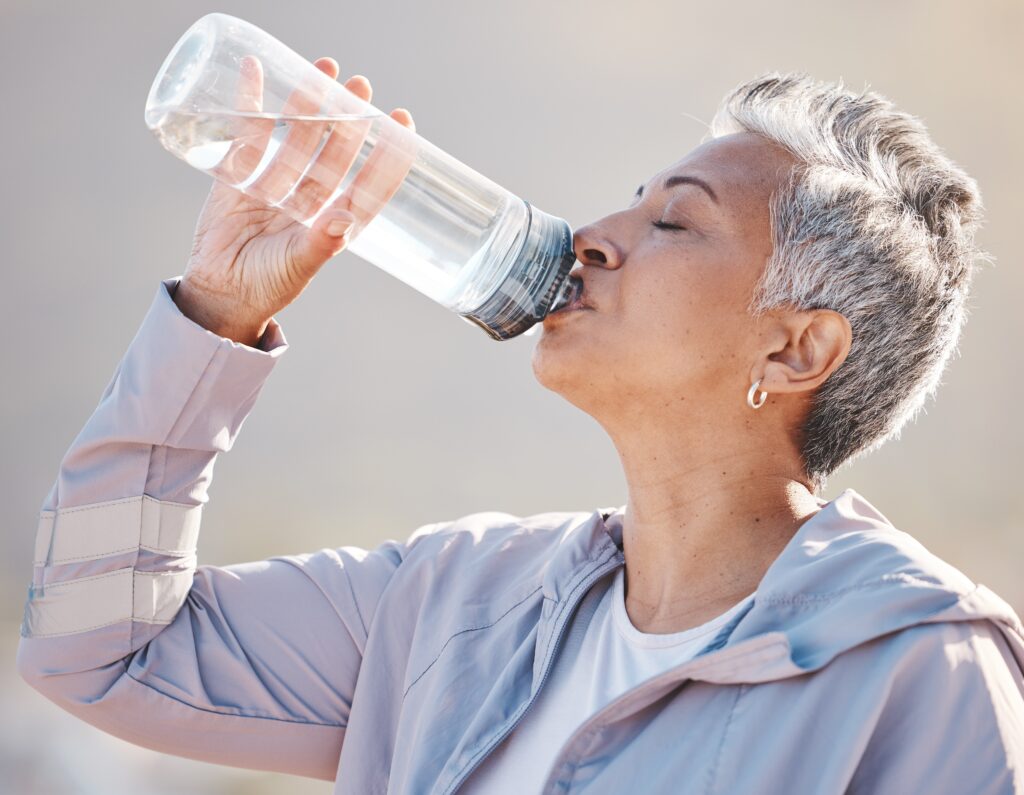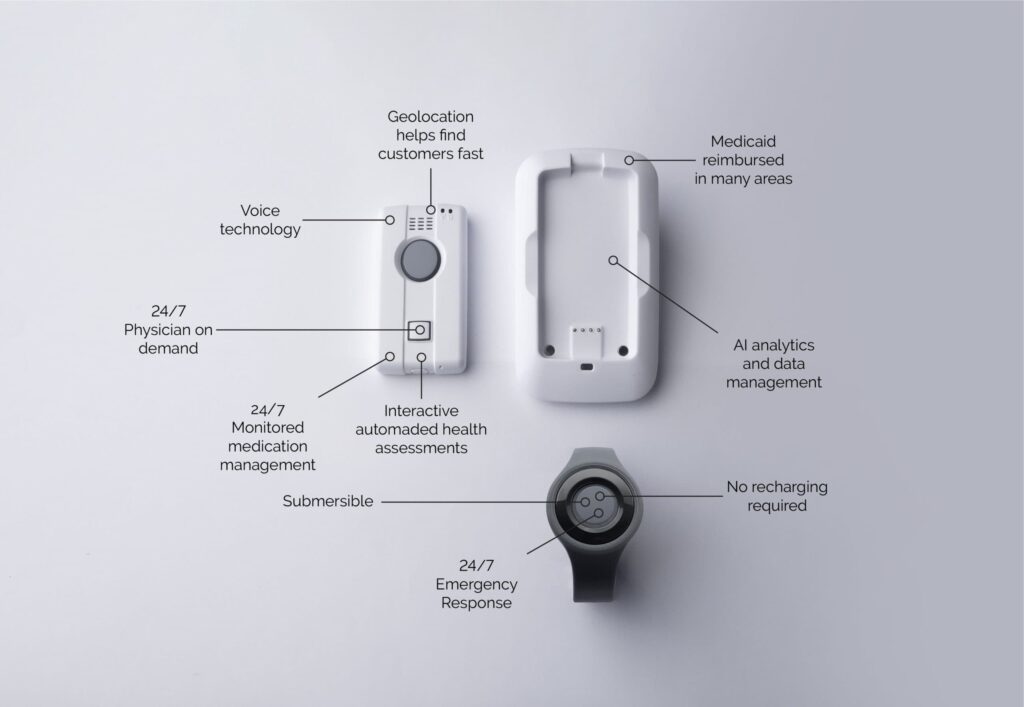Follow this Guide to Stay Safe and Healthy in the Heat
Whether planning a vacation or gearing up for the hot weather this summer, it’s important to be prepared for emergencies that may arise. And with record-breaking temperatures, it’s more vital than ever for older adults to take certain precautions. Follow this senior care plan to learn how you can stay safe and healthy in the heat.
Drink Plenty of Water
Staying hydrated is vital throughout all times of the year, but especially during the hotter months. Be sure to incorporate drinking water into your summer senior care plan. It helps the body function, brings nutrients to cells, protects joints and organs, and gets rid of wastes. It also maintains body temperature, according to the University of California, Davis.
Most importantly, be aware that the risk for dehydration is higher among seniors. This is due to many reasons, including diminished thirst and less water in the body. Taking certain medications can also increase dehydration risk, according to the National Council on Aging.
While the amount of water each person needs varies, the NCOA recommends drinking one-third of your body weight in fluids. “For example, if you weigh 150 pounds, aim to drink 50 ounces of water each day,” the NCOA says.
To stay hydrated, the NCOA suggests making drinking water part of your everyday routine. Keep water easily accessible by carrying a water bottle with you. Change it up by adding slices of fruit to your H20 or choosing low-sugar sports drinks or sparkling water. You can also contribute to your fluid intake by eating foods with high water content. These include cucumbers, watermelon, lettuce, strawberries, tomatoes, and celery. Avoid overdoing it on alcohol, coffee, and tea because these beverages can be dehydrating.

Senior Care for Fun in the Sun
Summer fun often includes outdoor activities, but too much time in the sun can be harmful to your skin. The elderly should take extra care, as their skin is thinner and more vulnerable.
The sun, as well as sun lamps and tanning beds, give off ultraviolet (UV) radiation. Exposure to UV radiation can further age the skin and cause skin cancer, according to the National Cancer Institute.
Don’t skip out on making skin care a permanent part of your summer senior care plan. Follow these tips recommended by the NCI to protect your skin from harmful rays:
- Wear a hat with a wide brim that shades your face, neck, and ears.
- Wear sunglasses that block UV radiation to protect the skin around your eyes.
- Wear long sleeves and pants. Tightly woven, dark fabrics are best. Look for fabrics rated with an ultraviolet protection factor (UPF). The higher the rating, the greater the protection from sun.
- Use sunscreen with a sun protection factor (SPF) of at least 15 (SPF 30, according to some doctors). Apply the product to skin 30 minutes before going outside and again every two hours or after swimming or sweating.
Stay Cool and Connected
As temperatures rise, it becomes even more important to have a summer senior care plan in place. Prolonged exposure to the heat can be a danger to your health, especially if you have existing health problems.
According to the National Institute on Aging, “older adults are at a higher risk for heat-related illnesses and death.” This can be due to health issues, such as cardiovascular, lung, and kidney disease. Other factors include taking certain prescription medications or being on several prescriptions at the same time. Additionally, being overweight or underweight, having an illness that causes weakness or fever, drinking alcoholic beverages, or becoming dehydrated, can put seniors at risk.
The NIOA lists the following heat-related illnesses that can occur:
- Heat syncope: sudden dizziness that can happen while being active in hot temperatures.
- Heat cramps: painful tightening or spasms of muscles in the stomach, arms, or legs.
- Heat edema: swelling in the ankles and feet when feeling hot.
- Heat rash: skin irritation from heavy sweating.
- Heat exhaustion: a warning that your body can no longer keep itself cool. Symptoms include feeling sweaty, thirsty, dizzy, weak, uncoordinated, and nauseated. Additionally, your skin may feel cold and clammy. Be aware of how you’re feeling, as heat exhaustion can lead to heat stroke.
- Heat stroke: a medical emergency in which the body’s temperature rises above 104°F. Signs of heat stroke are fainting, confusion, or acting strangely. Your body may not sweat even when it’s hot. Other symptoms include dry, flushed skin, rapid pulse, or a slow, weak pulse.
Senior Care and Heat-Related Illness
Certainly, your summer senior care plan should include being prepared to handle these issues if they arise. In many cases, heat-related illness can be resolved by following a few simple steps. If you begin to feel the warning signs of an illness, get out of the sun and into a cool place. Drink plenty of fluids (avoid alcohol and caffeine) and cool down with a cold bath or shower. You should also lie down and rest, according to the NIOA. However, if symptoms do not improve or you feel that your life is at risk, seek medical help immediately.
Get a Personal Emergency Response System
To ensure you are ready to handle a serious heat-related illness, consider getting a personal emergency response system (PERS). In fact, when it comes to senior care, a PERS can be a valuable tool throughout the entire year. Furthermore, owning a PERS will give you the confidence to go on trips and outings independently.
Electronic Caregiver’s Premier is the best senior care PERS on the market today. It includes an on-the-go pocket smart health device and wrist pendant with one-touch access to emergency services. Also, the Premier offers GPS and cellular based location services, so first responders can quickly determine your location. Additionally, Premier users have access to telehealth services and medication reminders. They can also use the Premier to stay connected with friends and family through personalized messages and alerts. This feature adds another layer of protection in case of emergencies.

Take Other Precautions
Along with investing in a PERS, try to make it a habit to share your summer plans with others. Check in with someone regularly, letting them know where you are and what you are doing. It’s also a good idea to try to stay in air-conditioned spaces as much as possible. Certainly, during the hottest part of the day, which is usually about three to five hours after noon.
In conclusion, having a senior care plan allows you to enjoy the summer while ensuring your health and safety. Remember to consult with your healthcare provider before making any significant changes to your routine. You should also speak to your doctor if you have specific health concerns.
